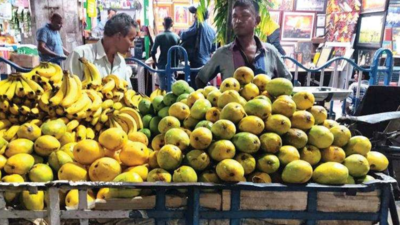Trending Topics
Goa: Mango loses pricey tag as varieties flood market

The Mangilar is going for Rs 700-800 per dozen, while the Goan Alphonso is being sold at Rs 500-600 per dozen
PANAJI: As the season for people’s favourite mancurad comes to an end, other local mango variants have started to trickle into the market, albeit on a pricier trend. Mangilar is going for Rs 700-800 per dozen, while the Afonso (Goan Alphonso) is being sold at Rs 500-600 per dozen.
In varieties from the neighbouring states, the Ratnagiri Alphonso is going for Rs 500 per dozen and the Kesar at Rs 120-150 per dozen. People are all smiles as the fruit is no longer drastically out of reach.
“Goans will always prefer local varieties over others. Though the prices are still on the higher side, they are purchasing the fruit in smaller quantities,” said Panaji-based fruit vendor Jafar Mokashi.
The mancurad is now going for Rs 1,600-2,000 per dozen, depending on the size.
“The mancurad’s productivity was very poor this season, leading to a serious shortage of the variant in the markets this year. The prices therefore continue to be on the higher side despite its season ending,” said Ali Shaikh, a fruit vendor.
When the king of fruits made its first appearance in the local market at the very start of the season, it was selling at prices fit for royalty. The mancurad variant of the golden fruit was going for Rs 6,000 per dozen.
At the time, the purchase of mango variants from other states, such as Badami, Lalbagh and Totapuri, appealed more to buyers owing to their affordable rates. Badami and Lalbagh were selling for Rs 300 per kg, while Totapuri was going for Rs 200 per kg.
Now, with local vari-eties that appeal more to the Goan palette hitting the re-tail market’s shelves, the dampened spirits of the buyers have lifted.
“A single tree would usually give 1,000-1,200 mangoes, which has now reduced to only 100 mangoes per tree. With such low productivity, one cannot expect the season to be fruitful for the farmer or vendor. As a result, buyers are unable to buy the fruit in quantities,” said Anil Naik, a customer.
In varieties from the neighbouring states, the Ratnagiri Alphonso is going for Rs 500 per dozen and the Kesar at Rs 120-150 per dozen. People are all smiles as the fruit is no longer drastically out of reach.
“Goans will always prefer local varieties over others. Though the prices are still on the higher side, they are purchasing the fruit in smaller quantities,” said Panaji-based fruit vendor Jafar Mokashi.
The mancurad is now going for Rs 1,600-2,000 per dozen, depending on the size.
“The mancurad’s productivity was very poor this season, leading to a serious shortage of the variant in the markets this year. The prices therefore continue to be on the higher side despite its season ending,” said Ali Shaikh, a fruit vendor.
When the king of fruits made its first appearance in the local market at the very start of the season, it was selling at prices fit for royalty. The mancurad variant of the golden fruit was going for Rs 6,000 per dozen.
At the time, the purchase of mango variants from other states, such as Badami, Lalbagh and Totapuri, appealed more to buyers owing to their affordable rates. Badami and Lalbagh were selling for Rs 300 per kg, while Totapuri was going for Rs 200 per kg.
Now, with local vari-eties that appeal more to the Goan palette hitting the re-tail market’s shelves, the dampened spirits of the buyers have lifted.
“A single tree would usually give 1,000-1,200 mangoes, which has now reduced to only 100 mangoes per tree. With such low productivity, one cannot expect the season to be fruitful for the farmer or vendor. As a result, buyers are unable to buy the fruit in quantities,” said Anil Naik, a customer.
Start a Conversation
FOLLOW US ON SOCIAL MEDIA
FacebookTwitterInstagramKOO APPYOUTUBE










